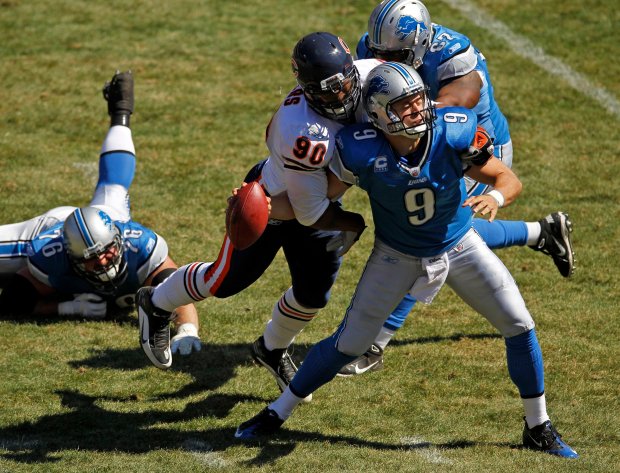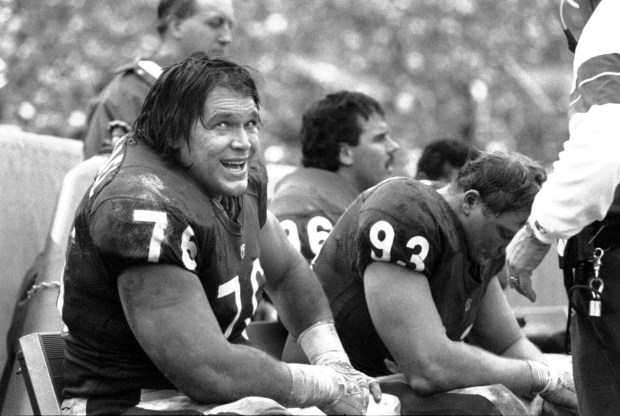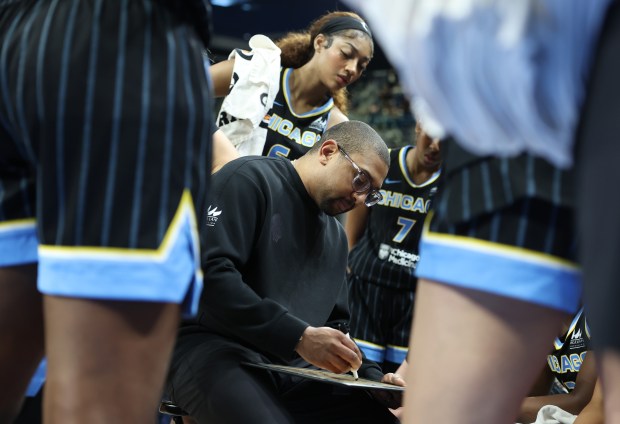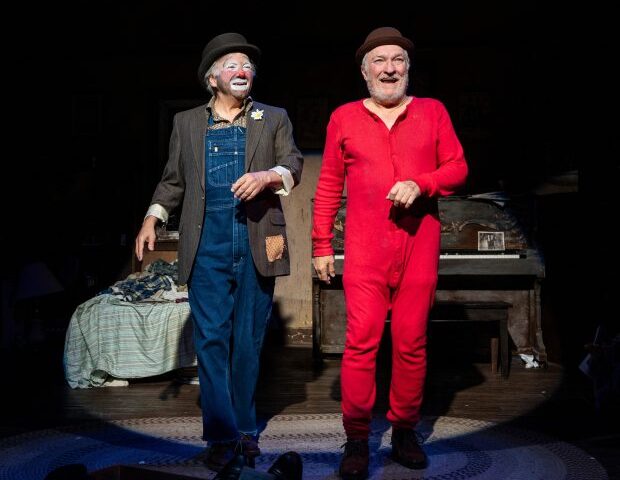As the Chicago Bears’ second pick in Round 2 of the 2006 NFL draft was approaching, general manager Jerry Angelo had a decision to make.
The Bears had selected Abilene Christian safety Danieal Manning at No. 42 after trading out of the first round in a deal with the Buffalo Bills, and they were going to be on the clock again at No. 57 after a couple more teams picked.
As the story goes, the Bears had narrowed their focus to two players: Ohio State cornerback Ashton Youboty and Miami’s Devin Hester, with the team uncertain if Hester would play cornerback or wide receiver.
Things were moving quickly, but back then teams were allotted 10 minutes to make second-round selections and Angelo wanted to hear one final pitch for each player. So he had Midwest scout Jeff Shiver state a case for Youboty and Mark Sadowski — the Southeast scout who had been pounding the table for Hester — make a last push for his guy.
Angelo made the call to go with Hester, and the rest is Bears history. The electric return man is a finalist for the Pro Football Hall of Fame for the third time.
The Class of 2024 will be revealed Thursday night during the NFL Honors show in Las Vegas, and there’s reason to believe Hester’s time has come — along with defensive end Julius Peppers, a first-time finalist who spent four of his 17 decorated seasons with the Bears and is a good bet to be enshrined with 159 1/2 career sacks.
The induction ceremony in Canton, Ohio, this summer could be a very navy-and-orange affair, as defensive tackle Steve McMichael is a seniors committee finalist. The Bears have a league-high 30 Hall of Famers who made their primary contributions to the sport with the team, and Hester and McMichael would augment that figure.
Here are the stories behind the arrival of all three players to the Bears.
From Halas to Covert: The 30 Chicago Bears inducted into the Pro Football Hall of Fame
Devin Hester
Devin Hester returns a fourth-quarter punt for a touchdown in his first NFL game against the Packers on Sept. 10, 2006, at Lambeau Field in Green Bay. (Chicago Tribune)
Hester’s Hall of Fame resume is highlighted by 20 career return touchdowns (14 punts, five kickoffs and one missed field goal) as well as the touchdown to begin Super Bowl XLI. The impact of his draft selection — and he was a curious second-round choice at the time because he lacked a true position on offense or defense — was realized immediately with an 84-yard punt return touchdown in his first game in Green Bay.
He would have five more return touchdowns that season and another six in 2007, and the Bears had a phenom — a player so dynamic on otherwise ho-hum plays between series that he revolutionized the sport.
“My argument for him is how he changed the game,” said Kansas City Chiefs special teams coordinator Dave Toub, who held that title with the Bears from 2004 through 2012. “They always talk about Hall of Fame guys, how they changed the game. He definitely changed the game. After Devin came into the league, everybody had to have a returner. Everyone wanted a guy like that because that is how we won games. We won games on defense and special teams. We proved you could do that.
“Everybody had to get a returner and then they had to get cover guys. Teams started getting guys for their roster that could run and tackle in space where their job was to cover kicks. Gunners became real important and then the emphasis on the kickers. They had to get better. They had to kick better. They had to get stronger legs so they could kick touchbacks. They had to get a better variety of kicks. There was a whole shift of personnel because you didn’t have big guys running down on kickoffs anymore.”
Kickers had to be more precise with their placement. They risked a costly penalty if an effort to pin the ball near the sideline rolled out of bounds. Punters had to be far more careful. Longtime special teams coordinator Joe DeCamillis, who worked for the Bears in 2013-14, said he directed his punters to kick short to Hester, which set up the offense with better field position. The theory was there was less space for the coverage team to travel.
“He just was unbelievable when he had any type of chance to back up at the start,” DeCamillis said. “If you hit a 50-yarder and he didn’t have to come up on that ball, you were in trouble. He was going to make you pay. His vision was uncanny when he had the ball in his hands.”
Ranking the 100 best Bears players ever: No. 19, Devin Hester
With only three true specialists in the Hall of Fame — kickers Morten Andersen and Jan Stenerud and punter Ray Guy (George Blanda was a quarterback and kicker, and Lou Groza was an offensive lineman and kicker) — the history of the game isn’t wholly reflected without a return specialist in Canton.
“What are there only three special teams guys in the Hall of Fame?” said Brian Mitchell, who had 13 return touchdowns in 14 seasons and holds the career records for kickoff and punt return yardage. “Why aren’t there other people in the Hall? Coaches always talk about that third aspect of the game.
“Get somebody in and get somebody else some respect. You play this game and when you do what you do and when your numbers stand up, you deserve that respect. I will definitely be happy for Devin.”
The fact Hester was a finalist the last two years showed how worthy a candidate he is, and the question quickly turned from if to when he will be elected. That time could be Thursday night.
Julius Peppers

Unlike the Hester draft decision, made with minutes ticking down until the Bears’ pick was up, there was no second choice to Peppers as free agency approached in 2010. That was before the NFL instituted a three-day negotiating window for teams and agents leading into free agency and back when the league year started at 11 p.m. Central time.
The Bears were all-in on signing Peppers after he spent his first eight seasons with the Carolina Panthers, and they crafted a coordinated plan that was completely within league guidelines to get Peppers’ signature on a contract as soon as possible.
Angelo, coach Lovie Smith, defensive coordinator Rod Marinelli and contract negotiator Cliff Stein flew to North Carolina via private jet at a time when the team seldom employed such luxuries.
When the clock struck midnight in North Carolina, Stein engaged Peppers’ agent, Carl Carey, in negotiations over the phone. It didn’t take long for them to agree to a six-year, $91.5 million deal with $42 million guaranteed for a player who had been selected to five Pro Bowls for the Panthers. That’s not out of the ordinary. For all the holdouts and negotiations that drag on over weeks and months, some deals are consummated in minutes.
With a verbal agreement done, the Bears sought permission to get Peppers’ signature on the contract and informed Carey they had a private jet to take Peppers to Chicago when he was ready. The strategy was key because then — and even now — some agents are known to shop deals once they have a team’s final offer. The last thing the Bears wanted was to risk Carey sharing the details with another team and potentially accepting a slightly more lucrative offer. Peppers was the whale on the open market that year.
Carey said everything was good, Peppers welcomed in the Bears contingent and his signature sealed the deal, dramatically improving an already elite defense. It was remarkable because finding a player of Peppers’ stature in free agency is only slightly easier than laying eyes on a unicorn. He was a transcendent player in his prime with a clean medical history and no off-field baggage.
Ranking the 100 best Bears players ever: No. 63, Julius Peppers
Just like Hester, Peppers’ impact was immediate. In his Bears debut, he had a strip-sack of Detroit Lions quarterback Matthew Stafford with 29 seconds remaining in the first half. The turnover resulted in Robbie Gould’s go-ahead 31-yard field goal on the final play of the half.
The Bears ranked in the top 10 that season in total defense, against the run and the pass and were fourth in scoring defense as they reached the NFC championship game. Peppers was a three-time Pro Bowl pick and a first-team All-Pro once in his four seasons with the Bears, logging 37 1/2 sacks, 10 forced fumbles and seven fumble recoveries in 64 games — he didn’t miss a single one.
The Bears didn’t have a losing season in Peppers’ four years. They’ve been under .500 in seven of 10 seasons since.
Steve McMichael

Like Peppers, McMichael was a free-agent signing, although one who arrived with much less fanfare. The New England Patriots drafted McMichael out of Texas in the third round in 1980. A bit of a troublemaker on the practice field and a wild man off the field, the Patriots cut him before the 1981 season.
The Bears were seeking depth on the defensive line and added McMichael ostensibly as a backup to future Hall of Famer Alan Page, who was entering his final season. Shortly after arriving, McMichael found himself in George Halas’ office for a meeting.
“The first thing Halas tells me up in his office is, ‘Son, I’ve heard what kind of (expletive) you are in practice. Don’t change,’” McMichael told the team website in 2016.
Ranking the 100 best Bears players ever: No. 18, Steve McMichael
He went on to stand out in the middle of one of the greatest defenses in league history, totaled 95 sacks and twice was a first-team All-Pro. Eventually McMichael became the player whom coach Mike Ditka referred to as the “toughest” he’d ever coached.
That’s how three players who could get the call from Canton on Thursday night were called to the Bears.





